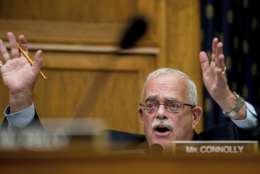Professional Services Council
-
A new pilot paves the way for speeding up supply chain manufacturing for both Department of Defense and industry.
December 19, 2022 -
From inflation adjustment to procurement leadtimes, the National Defense Authorization bill the Senate takes up today will address a few issues that have been nagging contractors for years.
December 13, 2022 -
From zero trust roadmaps to carbon reduction, federal agencies are moving under a lot of agendas. They all end up being contractors' concerns, too.
November 29, 2022 -
What does it mean for us? That's what federal contractors are asking themselves in the aftermath of the midterm elections.
November 15, 2022 -
The National Defense Strategy and the DoD Strategic Management Plan emphasized rivalry with China and the need to protect space and cyber assets.
November 01, 2022 -
The General Services Administration is surging resources to fix the problems with the Unique Entity Identifier (UEI) transition to the new validation service, but companies and lawmakers remain frustrated.
November 01, 2022 -
Contractors face the prospect of higher mandatory wages and treating independent subcontractors like employees. And that's not all. The vaccine mandate might be coming back.
October 18, 2022 -
Contractors are nervous about the continuing resolution the government is operating under since Saturday
October 04, 2022 -
Contractors working in buildings controlled by the General Services Administration might get buttonholed by a union organizer. That's allowed now under a rule the GSA just finalized. What do contractor executives think about that? The Federal Drive with Tom Temin talks about that with Stephanie Kostro, the executive vice president for policy at the Professional Services Council.
September 20, 2022 -
Within the next week, DoD hopes to update its policies to allow more vendors hit by inflation to request price increases on their fixed-price contracts.
September 08, 2022 -
Services contractors look at an executive order on new contractors keeping the employees of the displaced incumbent, project labor agreements on major construction
August 23, 2022 -
It’s that time of year when activity on Capitol Hill usually falls into a lull. But this year’s the rare occurrence when big legislative activity is happening in August. The Senate passed a huge reconciliation bill over the weekend; the House is expected to do the same later this week. Meanwhile both houses have a lot of work waiting for them to reconcile their versions of the annual appropriations and authorization bills.
August 09, 2022 -
The Defense Department has issued a request for information on a study of finance. Three years in development, the study is supposed to take a comprehensive look at financing and the financial health of the defense industrial base. Many contractors think the study is too narrow in scope.
July 26, 2022 -
Rep. Gerry Connolly (D-Va.), chairman of the Oversight and Reform Subcommittee on Government Operations, wrote to GSA on July 15 seeking answers to why the transition to UEI has struggled.
July 15, 2022 -
When the Biden Justice Department sued Booz Allen on antitrust grounds over Booz's acquisition of EverWatch, it sent a signal. The federal contracting class of companies isn't exempt from an aggressive anti-trust stance. Justice said the acquisition would combine the only two competitors in certain support services for national security.
July 12, 2022














